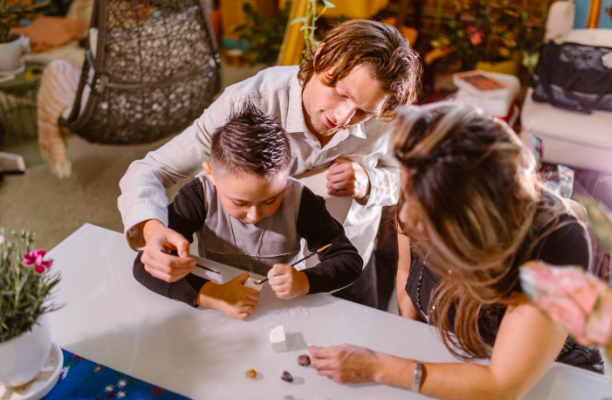Parents are eager to see their children blossom since they come into this world. From taking the first-ever step to graduating from preschool, these are all unforgettable moments that parents cherish throughout their lifetime. Providing the kids with opportunities to learn and explore the world and to develop communication, cognitive and analytical skills are the key areas where parents tend to focus more in their early childhood. Numerous studies have reinforced the concept that the first five years determine growth and development prospects in the later years of a child’s life.
To achieve the developmental milestones for a child, parents and the surrounding community, like peer groups, healthcare providers, and teachers, have a significant role to play. From birth till age five, a child’s education is highly based on sensory experiences, i.e. how they experience the world through their five senses. You might have noticed your child responding in a certain way as they hear any particular sound or trying to identify objects with the mental mapping of shapes, like calling a sandwich a triangle. They are also developing and polishing their language skills in their preschool to kindergarten phase. So the child is processing the information they receive from the outside world and store that information in their brain based on the associated experiences. At the preschool stage, a child’s neural network is simpler and is capable of processing information at the most basic level. With every next stage, this brain network becomes more complex, and the child can comprehend and analyze relatively complex information at the kindergarten stage.
This article will identify ten important concepts about early childhood education by exploring preschool vs. Kindergarten phases.
- Physical development and motor skills:
Development of fine and gross motor skills like crawling, holding objects, eye-hand coordination, and muscle movements are the building blocks for a child’s physical development at later stages. Therefore, ensure that age-appropriate games and physical activities are available for your child at both preschool and kindergarten.
- Communication and language skills:
A child mostly depends on sounds like crying, cooing, and body movements as the basic means of communication from birth until nine months or a year. Their language skills start developing in the preschool stage, and the vocabulary further expands in the kindergarten phase, where the kids can communicate in fully structured sentences.
- Reasoning and analytical skills:
Reasoning and analytical skills lie at the core of developing mathematical and scientific knowledge. In early education, children should be encouraged to develop these skills instead of making them cram the facts and numbers. They learn to develop causal and effectual relationships between different phenomena at both preschool and kindergarten levels. This skill helps them prepare for more complex problem-solving later in life.
- Creative skills:
A child’s brain is like a clean slate that provides much room for creativity and experiential learning. The creative skills are nourished through storytelling, hands-on activities, and crafting. At preschool and kindergarten, they are encouraged to have wild imaginations about the world, its objects, and outer space. These creative skills help them to come forward with the most innovative solutions for world problems.
- Social and interactive skills:
Human beings have a basic need for socialization. They’ve been living in communities since the stone-age. Social interactions bring social problems like conflicts and misunderstandings. Children learn to handle their social interactions from an early age, whether about sharing toys with their siblings or a heated argument with their classmates. Early education aim at teaching children about resolving conflicts and living amicably with their fellow beings.
- Developing empathy:
Empathy and kindness are essential elements for human existence in the world. Children are naturally kind and empathetic human beings. Childhood experiences can reinforce or dissociate them from these soft traits. Early childhood education means they are provided with a conducive environment where they develop a love language with their fellow beings and other creatures of the world.
- Discipline and organization:
Children are encouraged to be more disciplined and organized during their early years. Well, this doesn’t go against the idea of being creative and curious. It simply means that they are raised in a learning environment where they can organize their thought process and communicate well using their communication and language skills. It also suggests that children should be encouraged to become more productive by taking responsibility. These responsibilities may include packing their bags, taking care of their school belongings, or organizing their play area after they’re done playing.
- Nurturing inquisitiveness:
Children are curious, always eager to ask questions, and want to know about the simple facts of life. They give you a tough time asking weird questions like why the moon is round and not square or why we have two legs and not four legs like a horse. Being an adult, one may ask them silly questions, but this curiosity is very important to help children learn about the world and natural processes. Early childhood education at both preschool and kindergarten should certainly aim to nurture the inquisitive abilities of a child.
- Developing emotional intelligence:
Today’s world is quite sensitized towards the need to equip a child with emotional intelligence. Some studies even emphasize emotional intelligence (EI) more than IQ in the child’s early learning stages. Teaching a child emotional intelligence means armoring them with skills to regulate and manage their disruptive behaviors and positive emotions constructively. Anger management, fear management, and confidence building are a few skills to help raise mental health among children.
- Embracing diversity and inclusion:
In the world of conflict, racism, and social division, it is the need of the hour to provide your child with an environment that helps foster tolerance towards unpopular and diverse opinions and ideas. The early education system should prioritize a safe and constructive environment for all, irrespective of their background and socioeconomic status.
Conclusion:
Early childhood education plays a vital role in shaping the individuals of the future world. The learning environment children are provided with today will help them run tomorrow’s unpredictable world. Early childhood education should be targeted to achieve the goal of developing and nurturing the inborn abilities of a child instead of creating a hostile and pressurized environment where they will have to live as per the standards set by the adults.
































